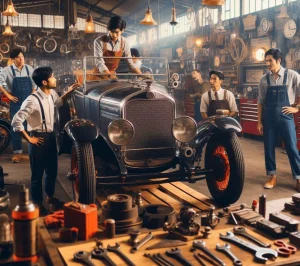In the early 70’s widebody airplanes like Boeing 747, Douglas DC-10 and Lockheed L-1011 “Tristar” were a synonym of comfort and huge capacity. After a decade of american hegemony in the sky, a new rival appeared on the horizont and the fight took fire on new territories. He exceeded the rivalry between Boeing and McDonnell Douglas only to burst into a duel between West Europe and the USA. The new airplane-manufactoring giant, which gradually was gathering strength against the american domination on the market, was a kid of the joint-venture between France, Germany, the UK and Spain. The collating of the biggest european countries was not accidental, because earlier each of them alone has suffered a reverse in the attempt to overcome the giants across the ocean – the frenchmen with their “Mercury” and “Caravelle”, the English with their “Trident”. But now, in the beginning of the21th century, Airbus is the best selling airplane-manufactoring company in the world, lefting behind the archirival Boeing.
Airbus Industries was founded in december 1970 by four consortiums: Aerospatiale – France (37.9%), Daimler-Benz Aerospace – Germany (37.9%), British Aerospace – UK (20%) and Casa – Spain (4.2%).
Airbus A 300-600 ST Beluga
The freighter made his first flight in 1994. His assigment is to transport the different parts of the Airbus airplanes (for example – wings, body, engines) from the manufacturer to the Airbus works in Toulouse, France. Because of his specific forms, Beluga is known as “the flying whale”.
Technical specs:
Lenght: 55.16m
Wingspan: 44.84m
Height: 17.25m
Range: 1 665-5 700km
Airbus A 300
Airbus A 300 is the first widebody airplane with two engines, assigned to transport passangers between the
european capital cities. The airplane can carry 250 passengers in two-class and 336 in one-class configuration. The first flight has been made on the 28th of october 1972. Since then 250 airplanes has been in five versions – B1, B2, B4-200, C4/F4, 600 and 600ER.
Technical specs:
Lenght: 54.08m
Wingspan: 44.84m
Height: 16.53m
Range: 6 968km
Airbus A-310
The next model is assigned to fly on long-range destinations. The first flight has been made on the 3rd of april 1982. The new airplane has shorter fuselage than A 300 and can carry less passangers. There are four versions of this aircraft – 200, 200C, 200F, and 300.
Technical specs:
Lenght: 46.64m
Wingspan: 43.89m
Height: 15.80m
Range: 9 175km
Airbus A-318
Airbus A318 is the smallest Airbus on the market. He belongs to the A320 family. The aircraft can carry 100 passangers. Thanks to the newest engines and technologies, A318 is the most rantabile airplane at the moment. He can compete with regional aircraft like Embraer and Bombardier.
Technical specs:
Lenght: 31.75m
Wingspan: 32.43m
Height: 11.76m
Range: 4 500km
Airbus A-319
The exploatation of the A-319 begins in may 1996 as the plane flies for first time in the colours of Swissair.
The model is a shortened version of A-320 and in two-class configuration can carry 126 passangers. With his range and capacity, A-319 can compete the dutch Fokker 100.
Technical specs:
Lenght: 33.84m
Wingspan: 34.10m
Height: 11.76m
Range: 4 500km
Airbus A-320
On the air festival in Le Bourget on the 6th of june 1981, Airbus presents his newest project – the A-320.
Built on the newest airspace technologies, A-320 is effective, efficient and easy for exploatation and maintenance, and most important – cheaper than the the other airplanes in this segment. A-320 can carry 146 passengers and steps into exploatation for Air France in 1988. Over 1100 aircraft have been built since 1984.
Technical specs(A-320-200):
Lenght: 37.57m
Wingspan: 34.10m
Height: 11.76m
Range: 5 551km
Airbus A-321
A-321 is the fourth plane of the A-320 family. He is a longer version of the base model – A-320. A-321 is assigned to carry 220 passangers in two-class configuration. His maximum take-off weight is 89 000kg.
104 airplanes have been delivered to the airlines.
Technical specs(A321-200):
Lengt: 44.51m
Wingspan: 34.10m
Height: 11.80m
Range: 4 907km
Airbus A-330
In november 1992 – one year after the first flight of A-340, takes off the first A-330. He is the biggest two-engine airplane of Airbus. There are two versions of the A-330 – A330-200 and A-330-300. The A-330-300 has the same dimensions as the A-340-300 but with two engines less and with 335 passangers can fly 8900km without refueling. He is also 20% lighter than the A-340-300 and has take-off weight of
208 000kg.
Technical specs(A-330-300):
Lenght: 63.65m
Wingspan: 60.30m
Height: 16.84m
Range: 8 900km
Airbus A-340
Special attention deserves the A-340 which is built as an answer of the Boeing 777. This four-engine, long-range aircraft makes his first flight on the 25th of october 1991. There are four variants of this plane – A-340-200, -300, -500 and -600. The differents between them are the dimensions, the capacity and the range. Alltogether 286 A-340s are delivered to the airlines.
Technical specs(A-340-200):
Lenght: 59.39m
Wingspan: 60.30m
Height: 16.74m
Range: 13 805km
Capacity: 262 (3-class config)
Technical specs(A-340-300):
Lenght: 63.65m
Wingspan: 60.30m
Height: 16.74m
Range: 12 325km
Capacity:295 (3-class config)
Technical specs(A-340-500):
Lenght: 66.83m
Wingspan: 63.60m
Height: 17.74m
Range: 15 355km
Capacity: 316 (3-class config)
Technical specs(A-340-600):
Lenght: 74.37m
Wingspan: 63.85m
Height: 17.14m
Range: 13 960km
Capacity: 375 (3-class config)
Airbus A-380
Airbus A-380 is the biggest commercial aircraft ever built. With his two-deck fuselage and huge fuel tanks, he can carry between 500 and 800 passangers on a destination of 14 800km. The airplane will be offered to the customers in two types – passanger(A-380-800) ang freighter(A-380-800F). There are 149 firm orders from the biggest airlines in the world, as Lufthansa, air France, SIA, Qantas, Emirates, Thai, FedEx.
Technical specs:
Lenght: 72.75m
Wingspan: 79.80m
Height: 24.08m
Range: 14 800km
Capacity: 555(3-class config)
Airbus A-350
The newest project of Airbus comes as an answer of the Boeing’s dreamliner – 787(7E7). He should compilate the newest and modern materials, technologies and engines (GeneralElectric – GEnx) to be the most efficient airplane in the world. With 250 passangers on board, the airplane should fly up to 17 000km. The A-350 should be 10% to 12% more efficient of the up to day existing long-range airplanes such as B777 and A340.






More Stories
The Best Autonomous Cars of the Year
Volvo Self Driving Cars: When Safety Meets Autonomy
Beyond the Wheel: Exploring Ford Autonomous Vehicle Revolution